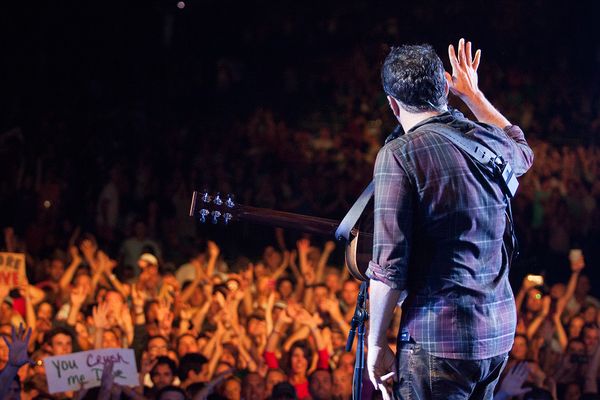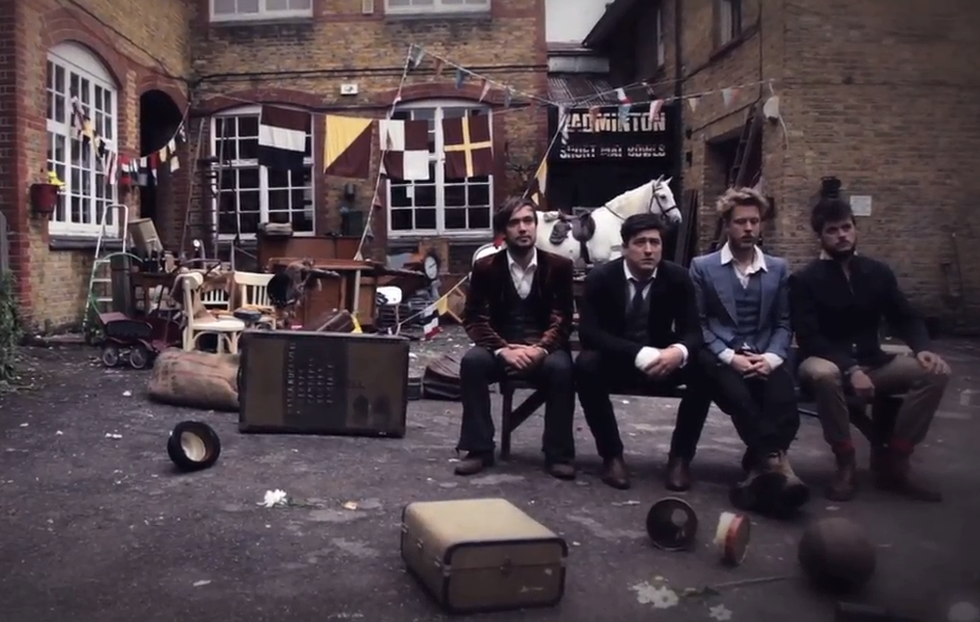My appreciation of the folk-rock-country-bluegrass band Mumford and Sons goes way beyond their unique sound. I discovered this extraordinary troupe in 2012, a few years after they came out with their first album. I was immediately attracted to their sound because I think that the banjo/acoustic guitar/trumpet/vocal harmony is a nice contrast to the dubstep/pop music that permeates our radios, commercials, and culture. That is not to say that I don't listen to this type of music as well. The music that Mumford and Sons creates is very refreshing, and it rings to the center of who we are as humans. As Bono said, the next era of music will "be totally naturalist, probably acoustic.� That'll be the music on the college campuses, because it'll remind us of something we've lost."
Additionally, the locution with which they write is very elevated, another quality that pop music lacks. These words carry much more significance, giving the themes of their songs so much more depth. For example, phrases such as "sanguine eyes," "farce," and "wanton ways" are used in "Lover of the Light," "Babel," and "The Wolf," respectively. This Rolling Stones interview with Mumford and Sons links the rich vocables to lead singer, Marcus Mumford's, Latin and Greek education in his early schooling years.
After listening to them for four years now, I have become pretty familiar with the lyrics. Especially over the year or so during when they disbanded, I retreated to listening to their first two albums over and over to experience the artistry held in the words and melody. I think one reason why Mumford and Sons has gained so much support is because their themes are so universal, yet they look deep into who we are. The themes that they write about are some of the most inherent to the human condition: love, death, faith, and anger. The Christian themes that are present also demonstrate how closely tied the human experience and Christianity are.
In the Rolling Stones interview, the author mentions that, "[Marcus Mumford's] spiritual journey is a 'work in progress,' but he's clear on one thing: He's never doubted the existence of God." Marcus's background with Christianity has been a little strained because he has struggled with "sin being preached louder than love." Both of his parent's being involved in an evangelical Christian movement in the UK led him to distance himself from the faith. However, I think because of his Christian upbringing, these Christian (and also human) themes are apparent throughout Mumford and Son's music. Marcus's struggle also reveals how it isn't always easy to be faithful, yet we have to keep trying. I've collected and reflected upon the Christian themes in a few of my favorite verses below.
"And where you invest your love, you invest your life"
This verse from "Awake My Soul" is pretty much a paraphrase of Matthew 6:21, "for where your treasure is, there also will your heart be."
"For you were made to meet your maker"
Again in "Awake My soul," Mumford and Sons reminds us of the reality of eternal life for which we all strive.
"But your soul you must keep, totally free"
Another truth revealed in "Awake My Soul" is this detachment from the world that keeps one's soul totally free. It reminds me of the Christian adage of being in the world, but not of it, which is repeated throughout the Bible.
"'Cause I know my weakness, know my voice / And I'll believe in grace and choice"
These lyrics in "Babel" emphasize the free will that we all have as humans and also the grace that God gives us to use our free will correctly.
"And I hunger and I thirst / For some shiver / For some whispered words / And the promise to come"
Throughout "Only Love," Mumford and Sons brings up loneliness, rebellion, and hope for the future. In these verses, they reveal how we all have a desire for community and hope deep within ourselves, despite bad circumstances.
"And you saw me low / Alone again / Didn't they say that only love will win in the end"
Continuing with "Only Love," they discuss the feelings of loneliness. However, there is the hope that love will win in the end. As Christians, that is our anthem too: Love has already won by defeating death on the dross.
"And I was still / I was under your spell / When I was told by Jesus all was well / So all must be well"
"Below My Feet" discusses the struggle of faith. The sarcasm in these lyrics can be easier seen in the context of the whole song, but it can still be understood in the resentment in "so all must be well." They show that it is easy to hear the truths of the faith, yet it is very difficult to accept them and apply them to life. However in the end of the song, they sing the humble chorus, asking God to teach and use them.
"Should you shake my ash to the wind / Lord forget all of my sins / And let me die where I lie / Beneath the curse of these lover's eyes"
Repentance is another part of our humanity discussed in these lines of "Lover's Eyes." I think that the curse of the lover's—God's—eyes portrays how unworthy we are of God's goodness to us; it may seem like they are a burden if we look at ourselves scrupulously instead of focusing on his mercy.
"So when your hope's on fire / But you know your desire / Don't hold a glass over the flame / Don't let your heart grow cold / I will call you by name / I will share your road"
I love this line because it is chock full of biblical imagery. For example, "I will call you by name" reminds me of the calling of the apostles, and "I will share your road" of the parable of the yoke (Matthew 11:30). The beginning line can also be symbolic of the hope of heaven found in the Holy Spirit, often depicted by fire.
"And there will come a time, you'll see, with no more tears / And love will not break your heart, but dismiss your fears / Get over your hill and see what you find there / With grace in your heart and flowers in your hair"
The imagery of an ideal existence without tears, heartbreak, and fear is a clear description of heaven. The soft intonations in "After the Storm" also convey the anticipated peace that one will feel whenever he or she reaches heaven.
"So tie me to a post and block my ears / I can see widows and orphans through my tears / I know my call despite my faults / And despite my growing fears"
This verse comes from my favorite song, "The Cave." There are three main allusions that people have identified in it: Plato's cave, Homer's "Odyssey," and Chesterton's "St. Francis of Assisi." These verses allude to Odysseus's adventure when he is tied to a post as his ship passes by the alluring Sirens. I think the last half refers to St. Francis in that God called him away from his former life, despite his past sins and fears. God does the same thing for us, calling us away from the allurements of the world to life.
"So come out of your cave walking on your hands / And see the world hanging upside down / You can understand dependence when you know the maker's land"
This last verse, also from "The Cave," alludes to both Plato's cave and Chesterton's "St. Francis of Assisi." You can see a commentary on Chesterton's text here. Basically both St. Francis and the man who comes out of the cave are transformed by the revelations they receive. St. Francis receives his calling to rebuke his wealth for a life of poverty and service, and the man in the cave learns to pursue truth in place of the images he sees in the cave.
I think the multiple allusions and expression of themes so close to man's existence are what make Mumford and Sons so rich. How they embrace the struggles of life but also the future hope is one way that I see their Christian themes. Their strong biblical imagery also doesn't hurt.




















